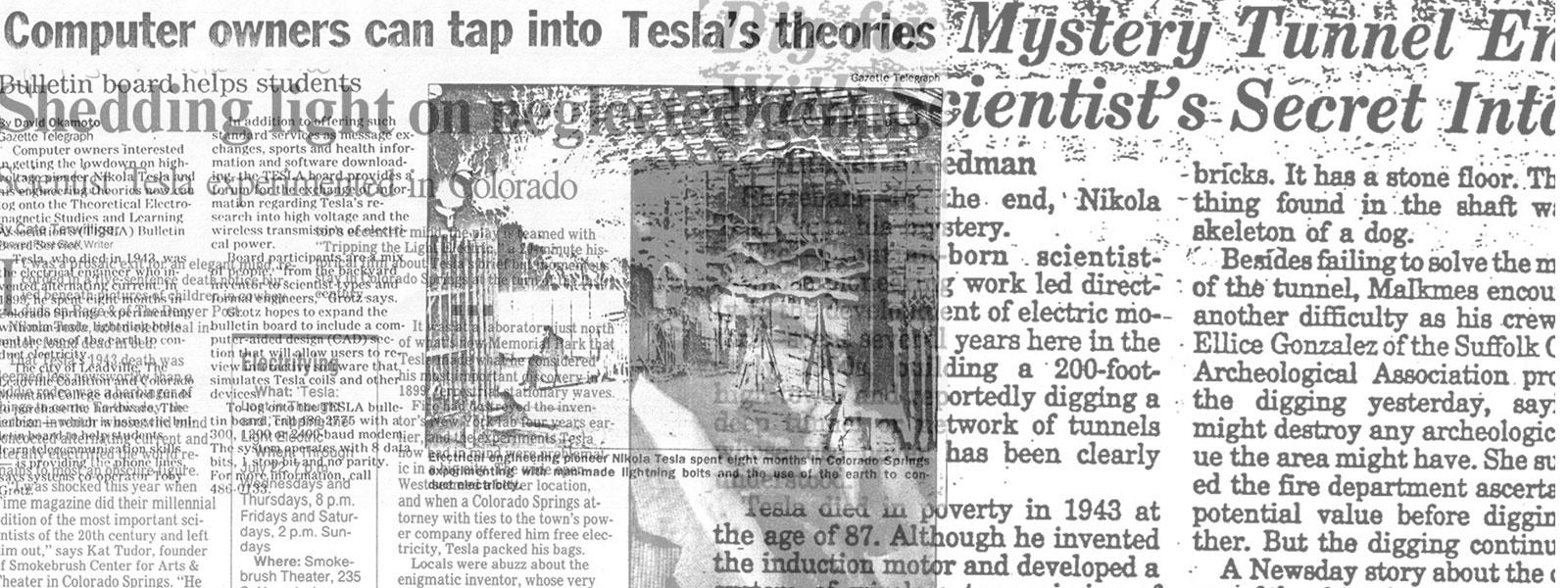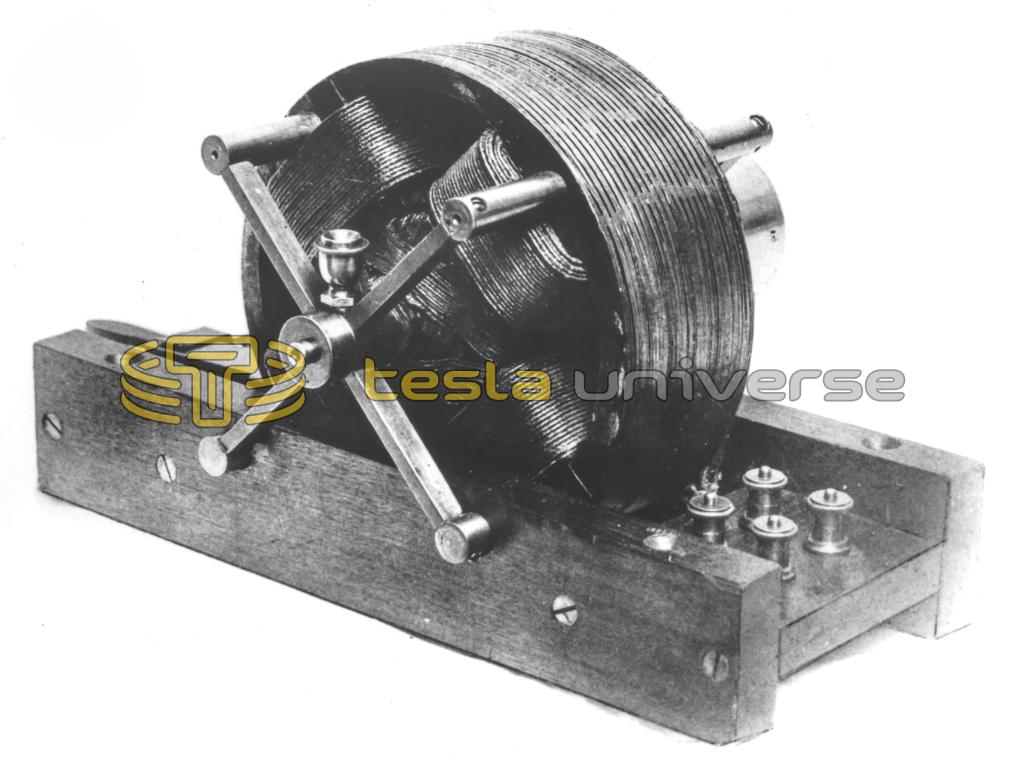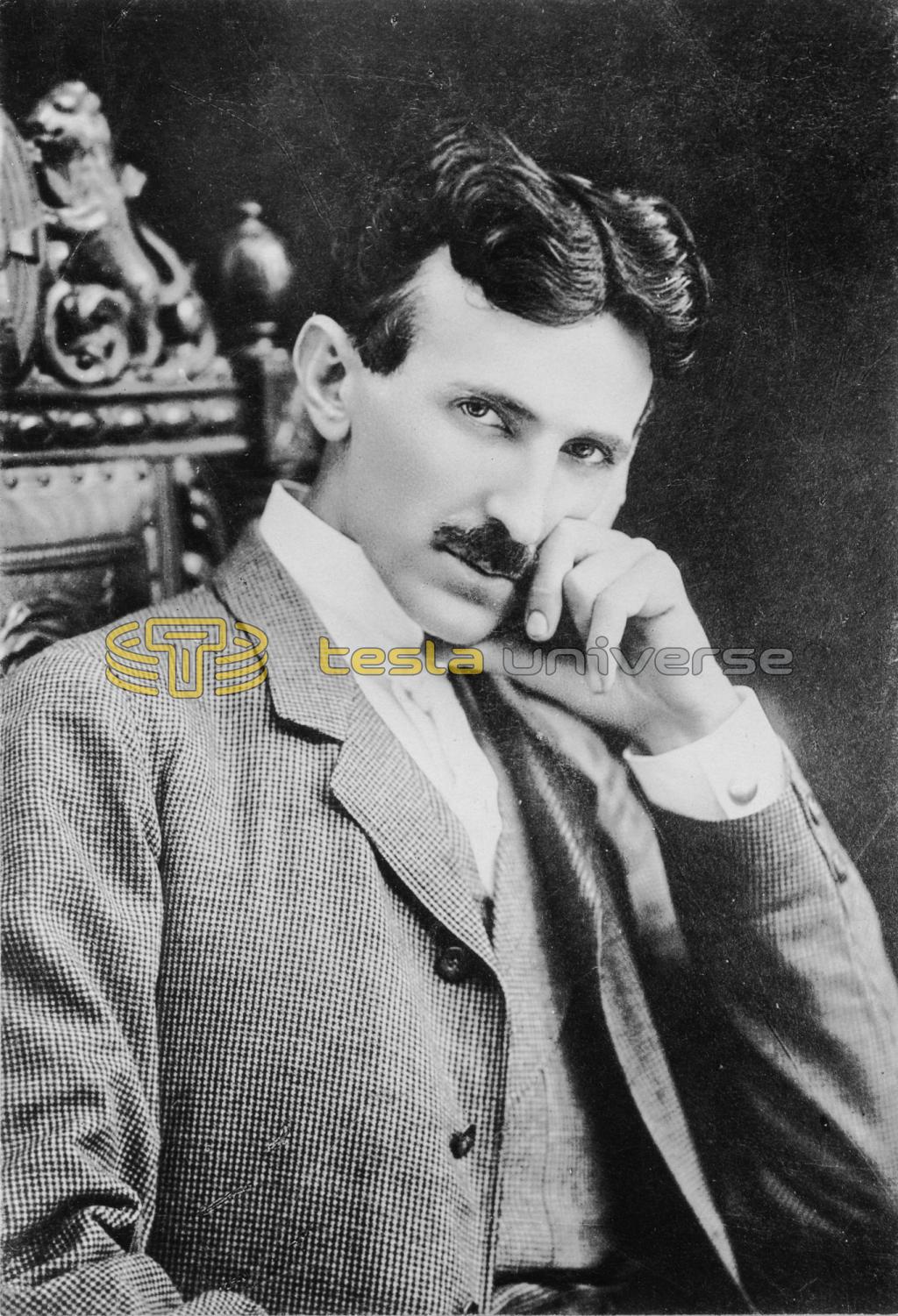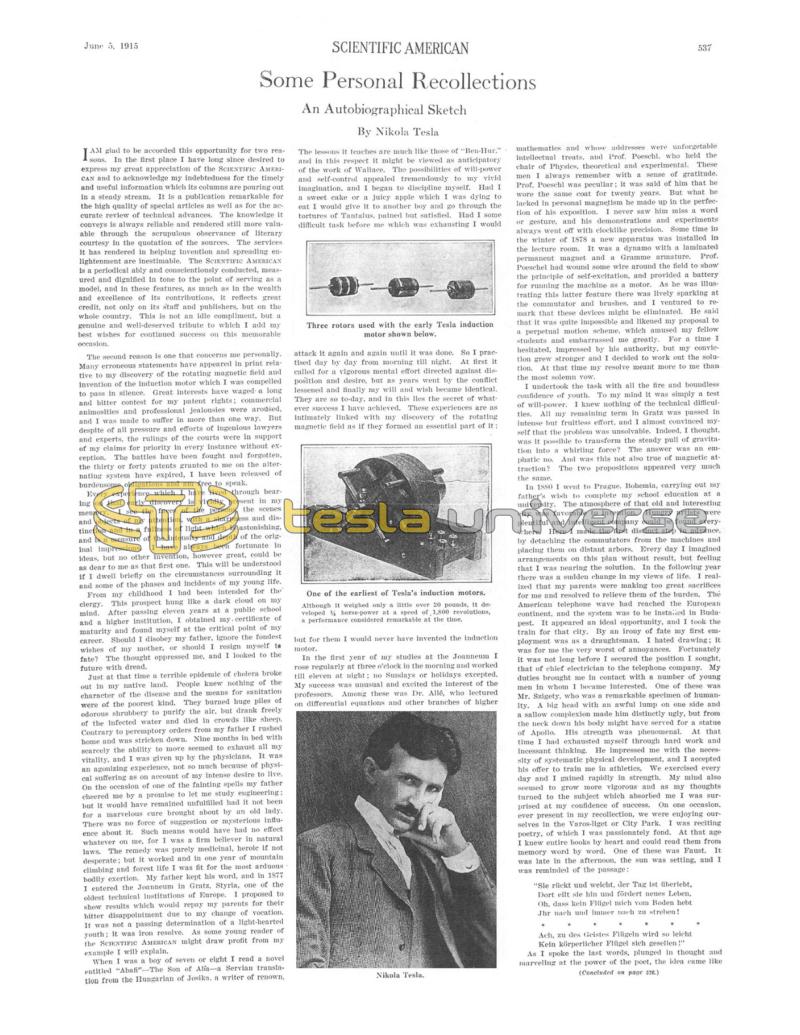
Nikola Tesla Articles
Some Personal Recollections
An Autobiographical Sketch
I am glad to be accorded this opportunity for two reasons. In the first place I have long since desired to express my great appreciation of the Scientific American and to acknowledge my indebtedness for the timely and useful information which its columns are pouring out in a steady stream. It is a publication remarkable for the high quality of special articles as well as for the accurate review of technical advances. The knowledge it conveys is always reliable and rendered still more valuable through the scrupulous observance of literary courtesy in the quotation of the sources. The services it has rendered in helping invention and spreading enlightenment are inestimable. The Scientific American is a periodical ably and conscientiously conducted, measured and dignified in tone to the point of serving as a model, and in these features, as much as in the wealth and excellence of its contributions, it reflects great credit, not only on its staff and publishers, but on the whole country. This is not an idle compliment, but a genuine and well-deserved tribute to which I add my best wishes for continued success on this memorable occasion.
The second reason is one that concerns me personally. Many erroneous statements have appeared in print relative to my discovery of the rotating magnetic field and invention of the induction motor which I was compelled to pass in silence. Great interests have waged a long and bitter contest for my patent rights; commercial animosities and professional jealousies were aroused, and I was made to suffer in more than one way. But despite of all pressure and efforts of ingenious lawyers and experts, the rulings of the courts were in support of my claims for priority in every instance without exception. The battles have been fought and forgotten, the thirty or forty patents granted to me on the alternating system have expired, I have been released of burdensome obligations and am free to speak.
Every experience which I have lived through bearing on that early discovery is vividly present in my memory. I see the faces of the persons, the scenes and objects of my attention, with a sharpness and distinction and in a fullness of light which is astonishing, and is a measure of the intensity and depth of the original impressions. I have always been fortunate in ideas, but no other invention, however great, could be as dear to me as that first one. This will be understood if I dwell briefly on the circumstances surrounding it and some of the phases and incidents of my young life.
From my childhood I had been intended for the clergy. This prospect hung like a dark cloud on my mind. After passing eleven years at a public school and a higher institution, I obtained my certificate of maturity and found myself at the critical point of my career. Should I disobey my father, ignore the fondest wishes of my mother, or should I resign myself to fate. The thought oppressed me, and I looked to the future with dread.
In the first year of my studies at the Joanneum I rose regularly at three o'clock in the morning and worked till eleven at night; no Sundays or holidays excepted. My success was unusual and excited the interest of the professors. Among these was Dr. Allé, who lectured on differential equations and other branches of higher mathematics and whose addresses were unforgettable intellectual treats, and Prof. Poeschl, who held the chair of Physics, theoretical and experimental. These men I always remember with a sense of gratitude. Prof Poeschl was peculiar; it was said of him that he wore the same coat for twenty years. But what he lacked in personal magnetism he made up in the perfection of his exposition. I never saw him miss a word or gesture, and his demonstrations and experiments always went off with clocklike precision. Some time in the winter of 1878 a new apparatus was installed in the lecture room. It was a dynamo with a laminated permanent magnet and a Gramme armature. Prof. Poeschi had wound some wire around the field to show the principle of self-excitation, and provided a battery for running the machine as a motor. As he was illustrating this latter feature there was lively sparking at the commutator and brushes, and I ventured to remark that these devices might be eliminated. He said that it was quite impossible and likened my proposal to a perpetual motion scheme, which amused my fellow students and embarrassed me greatly. For a time I hesitated, impressed by his authority, but my conviction grew stronger and I decided to work out the solution. At that time my resolve meant more to me than the most solemn vow.
I undertook the task with all the fire and boundless confidence of youth. To my mind it was simply a test of will-power. I knew nothing of the technical difficulties. All my remaining term in Gratz was passed in intense but fruitless effort, and I almost convinced myself that the problem was unsolvable. Indeed, I thought, was it possible to transform the steady pull of gravitation into a whirling force! The answer was an emphatic no. And was this not also true of magnetic attraction? The two propositions appeared very much the same.
"Sie rückt und weich, der Tag ist überlebt,
Dort eilt sie bin und fördert neues Leben,
Oh, das kein Flügel mich vom Boden hebt
Jhr nach und immer nach zu streben!
Ach, zu des Geistes Flügeln wird so leicht
Kein körperlicher Flügel sich gesellen!"
"The glow retreats, done is the day of toil
It yonder hastes, new fields of life exploring;
Ah, that no wing can lift me from the soil
Upon its track to follow, follow soaring!
"Alas! the wings that lift the mind no aid
Of wings to lift the body can bequeath me."
As I spoke the last words, plunged in thought and marveling at the power of the poet, the idea came like a lightning flash. In an instant I saw it all, and I drew with a stick on the sand the diagrams which were illustrated in my fundamental patents of May, 1888, and which Szigety understood perfectly.
It is extremely difficult for me to put this experience before the reader in its true light and significance for it is so altogether extraordinary. When an idea presents itself it is, as a rule, crude and imperfect. Birth, growth and development are phases normal and natural. It was different with my invention. In the very moment I became conscious of it. I saw it fully developed and perfected. Then again, a theory, however plausible, must usually be confirmed by experiment. Not so the one I had formulated. It was being daily demonstrated every dynamo and motor was absolute proof of its soundness. The effect on me was indescribable. My imaginings were equivalent to realities. I had carried out what I had undertaken and pictured myself achieving wealth and fame. But more than all this was to me the revelation that I was an inventor. This was the one thing I wanted to be. Archimedes was my ideal. I admired the works of artists, but to my mind, they were only shadows and semblances. The inventor, I thought, gives to the world creations which are palpable, which live and work.
The telephone installation was now completed and in the spring of 1882 an offer was made me to go to Paris, which I accepted eagerly. Here I met a number of Americans whom I befriended and to whom I talked of my invention, and one of them, Mr. D. Cunningham, proposed to form a company for exploitation. This might have been done had not my duties called me to Strasburg, Alsace. It was in this city that I constructed my first motor. I had brought some material from Paris, and a disk of iron with bearings was made for me in a mechanical shop close to the railroad station in which I was installing the light and power plant. It was a crude apparatus, but afforded me the supreme satisfaction of seeing for the first time, rotation affected by alternating currents without commutator. I repeated the experiment with my assistant twice in the summer of 1883. My intercourse with Americans had directed my attention to the practical introduction and I endeavored to secure capital, but was unsuccessful in this attempt and returned to Paris early in 1884. Here, too, I made several ineffectual efforts, and finally resolved to go to America, where I arrived in the summer of 1884. By a previous understanding I entered the Edison Machine Works, where I undertook the design of dynamos and motors. For nine months my regular hours were from 10:30 A. M. till 5 A. M. the next day. All this time I was getting more and more anxious about the invention and was making up my mind to place it before Edison. I still remember an odd incident in this connection. One day in the latter part of 1884 Mr. Bachelor, the manager of the works, took me to Coney Island, where we met Edison in company with his former wife. The moment that I was waiting for was propitious, I was just about to speak when a horrible looking tramp took hold of Edison and drew him away, preventing me from carrying out my intention. Early in 1885 people approached me with a proposition to develop an arc light system and to form a company under my name. I signed the contract, and a year and a half later I was free and in a position to devote myself to the practical development of my discovery. I found financial support, and in April, 1887, a company was organized for the purpose, and what has followed since is well known.
A few words should be said in regard to the various claims for anticipation which were made upon the issuance of my patents in 1888, and in numerous suits conducted subsequently. There were three contestants for the honor, Ferraris, Schallenberger and Cabanellas. All three succumbed to grief. The opponents of my patents advanced the Ferraris claim very strongly, but any one who will peruse his little Italian pamphlet, which appeared in the spring of 1888, and compare it with the patent record filed by me seven months before, and with my paper before the American Institute of Electrical Engineers, will have no difficulty in reaching a conclusion. Irrespective of being behind me in time, Prof. Ferraris's publication concerned only my split-phase motor, and in an application for a patent by him priority was awarded to me. He never suggested any of the essential practical features which constitute my system, and in regard to the split-phase motor he was very decided in his opinion that it was of no value. Both Ferraris and Schallenberger discovered the rotation accidentally while working with a Gullard and Gibbs transformer, and had difficulty in explaining the actions. Neither of them produced a rotating field motor like mine, nor were their theories the same as my own. As to Cabanellas, the only reason for his claim is an abandoned and defective technical document. Some over-zealous friends have interpreted a United States patent granted to Bradley as a contemporary record, but there is no foundation whatever for such a claim. The original application only described a generator with two circuits which were provided for the sole purpose of increasing the output. There was not much novelty in the idea, since a number of such machines existed at that time. To say that these machines were anticipations of my rotary transformer is wholly unjustified. They might have served as one of the elements in my system of transformation, but were nothing more than dynamos with two circuits constructed with other ends in view and in utter ignorance of the new and wonderful phenomena revealed through my discovery.



